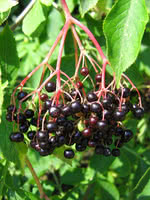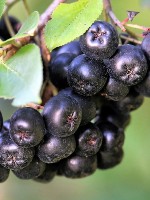Mon-Fri 9am - 5pm Mountain time
Black Elderberry vs Viking Aronia Berry
Sambucus canadensis
Aronia melanocarpa Viking
NOT AVAILABLE THIS SEASON - MIGHT RETURN
NOT AVAILABLE THIS SEASON - MIGHT RETURN
Black Elderberry is a deciduous shrub native to eastern North America. You can plant this shrub in moist areas and it will help stabilize your soil. You can also use it on rural properties anywhere you'd use a lilac.
Black Elderberries are considered to be partially self-pollinating. So while they will still produce some berries without cross-pollination, planting with another variety will increase yields. Consider planting with Ranch Elderberry or Bob Gordon Elderberry.
Warning: the seeds, stems, leaves, roots, and uncooked berries of the Black Elderberry are poisonous to humans when eaten in quantity. You should cook the berries to make them safe for human consumption.
Viking Aronia Berry is easy to grow, with black berries that are high in antioxidants. The Viking variety is much more productive than the non cultivar Aronia Berry. The berries can be eaten fresh but are found to be tart and bitter. They are more often used in baking, jams, juices, and wine. They have small, white flowers with a hint of pink that grow evenly on the shrub. The summer foliage turns a very attractive red in the fall.
The Viking Aronia Berry is a self-pollinating plant. Because of its uniformity and high yield, the Viking Aronia Berry is a popular cultivar.
Black Elderberry Quick Facts
Viking Aronia Berry Quick Facts
Toxicity: leaves, stems, and uncooked berries are poisonous to humans

